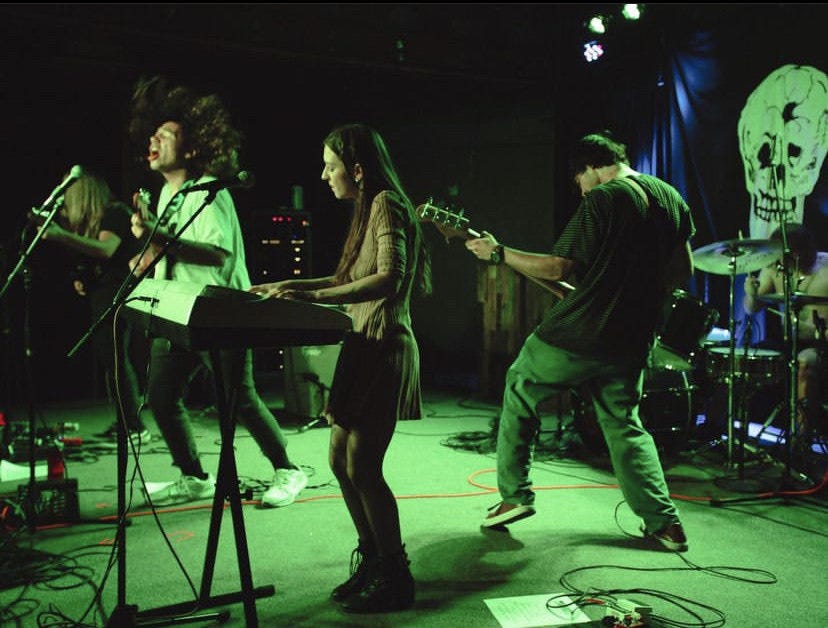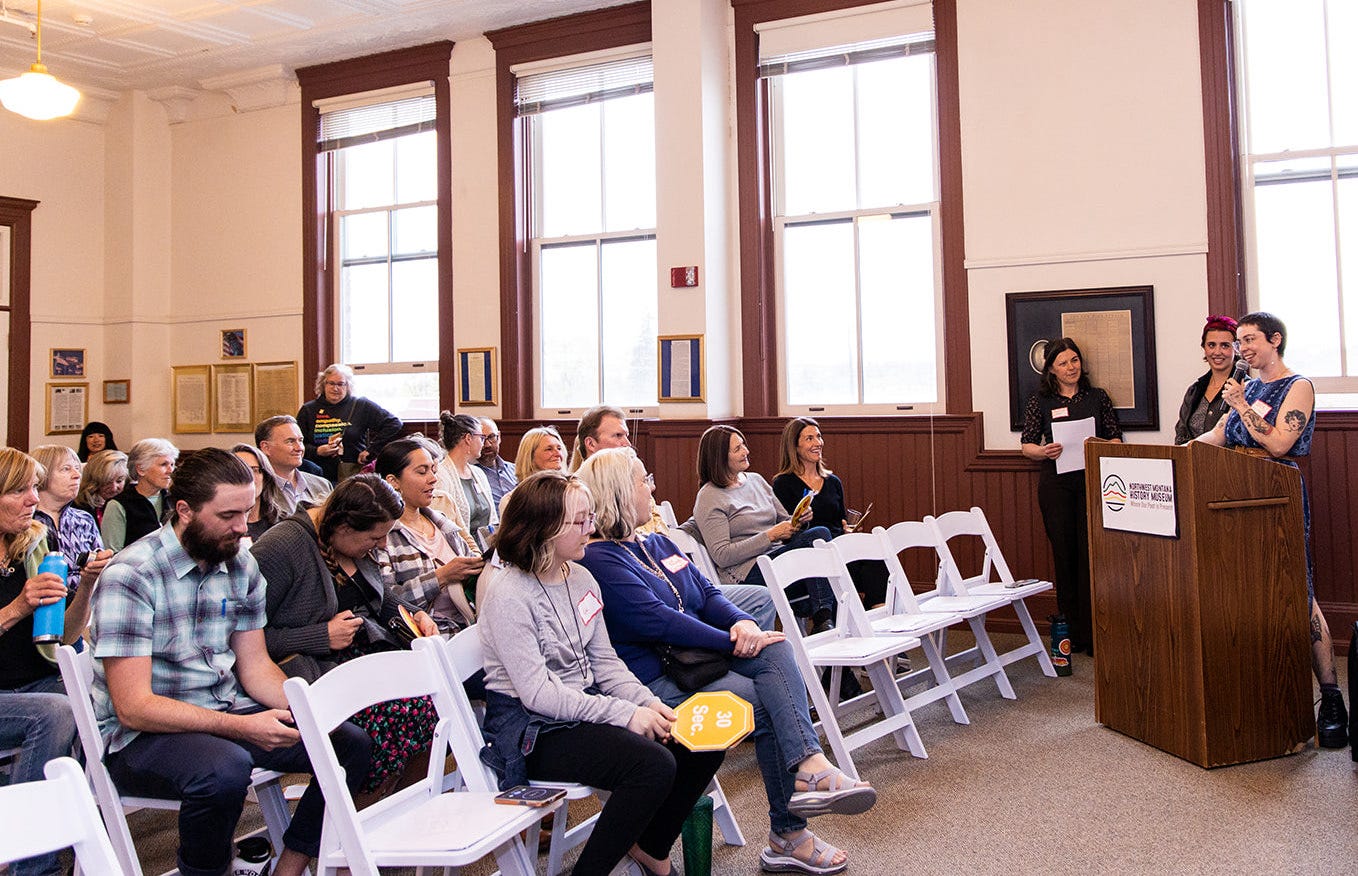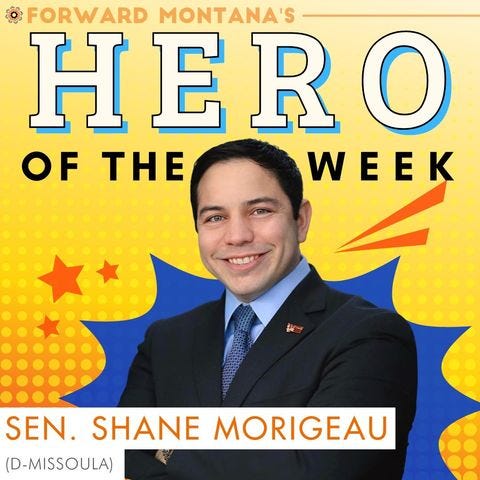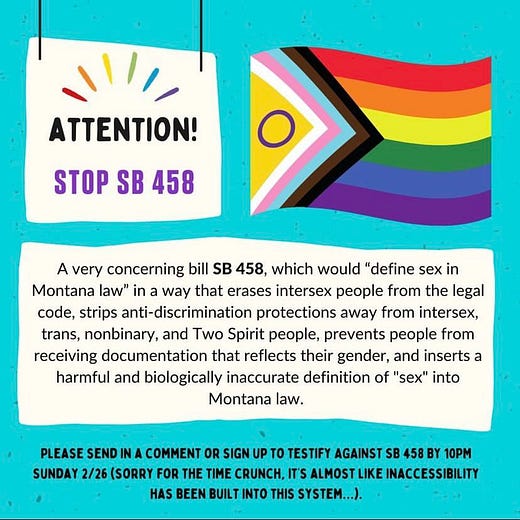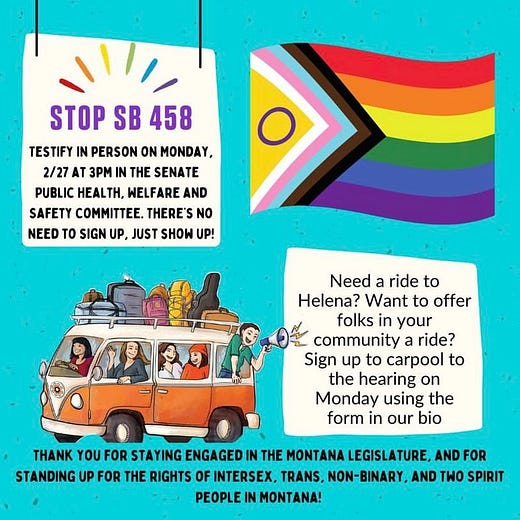Heroes, Villains and the Fight for Trans Rights: 5 Questions for Izzy Milch of Forward Montana
Plus, a gloriously perplexing punk-pop-reggae tour de force from Billings' Hey, ily
Welcome to Big Sky Chat House— a newsletter about movers and shakers in Montana.
If you found this email in your Promotions folder, please move it to your Primary inbox. That will make it easier to find down the road, and teach Gmail to send it to other subscribers’ Primary inboxes as well. Thanks!
Montana Song of the Week!
Billings’ infectious, shape-shifting five-piece Hey, ily (as in, “Hey, I love you!”) has mastered the art of keeping us guessing. Over the course of several releases, Hey, ily has explored elements of synth-driven pop, emo, stoner metal, the bleeps and blips of video games and a whole slew of other styles…often within the same song.
“Friend Group From Hell,” the A-side from their recent two track single, embodies that carnivalesque energy. In four minutes, it morphs—sometimes subtly, and sometimes abruptly—from emo-inflected punk-rock, to sugary pop, to a wholly unexpected (and grin-inspiring) reggae-infused coda. Intermittently, the band slams on the breaks, giving Caleb Haynes’ distorted vocals the full spotlight, before dive bombing back into the fray.
“Friend Group From Hell” captures the sound of a band hungry to challenge itself, and unwilling to stay in any place for long. And sure, the song’s narrator laments their friends that “gorge themselves” on rock’n’roll, but Hey, ily can’t help but remind us just how exuberant that music can be.
Interested in having your music featured in BSCH? Get at me. msavagelevenson@gmail.com
5 Questions for Izzy Milch of Forward Montana
Both in the state Capitol and on the internet, Forward Montana’s Izzy Milch has been hard to miss this legislative session.
Forward Montana champions a handful of issues—housing, climate justice, voting rights and trans equality—with a focus on young Montanans, and Izzy has been on the frontlines of that advocacy work. 2023 marks their second legislative session as part of the organization.
Beyond their work testifying at bill hearings, Izzy hosts the organization’s “What the Helena” podcast and has helped craft Forward Montana’s contentious “Hero / Villain of the Week” series, in which one lawmaker gets some love, and another gets…well, less love.
Izzy and I caught up—incidentally, the day before the national Trans Day of Visibility—to discuss the details of some of the state bills poised to impact Montana’s trans and queer communities, the pros and cons of the “Hero / Villain” series, their assessment of the Montana Republican Party and some unexpected lessons learned from their work with Forward Montana.
Max: What did you learn from working in the 2021 session that you’ve applied to this go-around?
Izzy Milch: I think a lot of it was just absorbing the fact that legislators are people (laughs), especially in a citizen legislature. Some of them are lawyers and some of them are policy experts, but a lot of them just don't have more experience with the things they're considering than I do. And so I’m getting past that imposter syndrome hump [to feel like] we all have things to say that should be of value to them. Whether or not they listen is kind of out of my control, but I'm gonna say what I have to say.
The other thing that's changed for me between last session and this session is having different definitions of success and effectiveness.
We work on housing, climate justice, voting rights and trans equality. On housing, I think we'll get some good policy out of this session. But when it comes to trans rights, [lawmakers are] not gonna change their votes based on what I say to them. That's become really, really clear, especially this session.
In those committee hearings, I'm not really talking to the legislators. It's more for the people who are listening. We know that young trans people are watching those hearings. It feels a lot more important to have consistent voices in that room being like, “You can grow up here. We are in every aspect of public life in Montana, and we're always going to be. There are people who are always gonna be in this room fighting for your right to live a full life here.” And that's felt way more important than coming up with some perfectly-crafted argument that [lawmakers] are going to ignore.
Have you experienced a disconnect between lawmakers’ voting records and what they say to you in private about some of the issue areas that you cover?
Representative Zooey Zephyr [who is a trans woman] has said this publicly a lot of times. There are people in that building who will vote one way and then say that they really care about her or like they're proud of her for speaking up or whatever. And I just have no patience for that.
There are people who treat us with respect and kindness in one-on-one conversations, and then will turn around and just say the most heinous things on the floor.
Over the course of the session, a range of political insiders have described to me what they see as a distinction between lawmakers who approach voting as transactional—I’ll vote for your bill if you vote for mine—versus those with a more ideological bent. Does that distinction resonate with you, and if so, does it impact your work?
Yeah. I think there are a lot of people, especially within the Republican Party, who are scared of the Party and its enforcement mechanisms. I know that this year in particular, they’re really explicit about watching who’s breaking party lines and having plans to primary those people.
And I know that a lot of people are really scared of that, and it's probably caused them to vote in ways that they might not agree with, or to just vote along party lines on things that they don't have strong feelings about. I understand that fear of consequences for taking a stand, especially if it's something that they're not super passionate about.
As far as how it impacts our work, I don't know if there's a meaningful difference between someone who's just gonna vote along party lines because it's the easy thing to do and someone who really has those strong convictions.
I want to talk about the weekly “Heroes and Villains” post. It’s pretty divisive, and I imagine that it could potentially burn bridges for Forward Montana. How do you consider the pros and cons of publicly calling lawmakers villains?
A lot of the “villains” either don't care or are posting it on the internet [proudly].
I've also had some unnamed [“villains”] who have been really upset about it and who have refused to work with people who've been associated with us because of being villainized.
But a lot of that accountability work isn't really for them. It's for people in their district who might have just moved there, or just turned eighteen, or might have not been engaged in the electoral process. Many of these processes are really inaccessible on purpose.
[We’re] illuminating that and saying, do you agree with this? Is this the person that you voted for? Maybe you didn't vote in this election and maybe you will vote in the next one now. Or maybe this is gonna be the thing that gets you interested in the legislative process. That's the real use of the “Heroes and Villains.”
As far as burning bridges. I mean, I would hope that people who want to work with us and see us villainizing them take it as a wake-up call, but I don't know how realistic that is (laughs).
If it were me, I would like to think that if I were a villain it would cause some self-reflection. I don't know if it'll burn bridges. We do tend to choose people who wouldn't work with us anyway.
One quick follow-up: Where’s the line between a bill you think is shitty and someone or something that’s “villainous?”
We don't make personal attacks. It's contentious language, but it's never about them personally: it's about their policies or it's about the procedures that they're participating in or the things that they're saying on the record about people.
Can you point to an instance where you’ve been surprised by reactions to your work, specifically from your supporters?
I've gotten responses to emails or calls-to-action on certain bills that I've been really surprised by. There have been some around trans things that I've gotten responses to—primarily from older supporters of our work—who have said, “I've supported you for a long time, but this is where I draw the line.”
This session we’ve gotten some pushback on our support for statewide zoning reform policies. I think housing is a really interesting [issue]. We all agree that there's a need for more affordable housing. But it's hard to find those points of agreement about how we get there and what's gonna help and what's gonna hurt. So I've been surprised by the coalitions that we've been able to find.
[Trans rights] is a newer issue compared to how long [Forward Montana has] been around and what we've historically worked on. So I think there are a lot of people who have supported our work on voting rights and climate who honestly probably just don't know any trans people, or don't know that they know trans people. The message that I'm thinking of was in response to something about sports, which gets really contentious.
[Some] old people get really mad about how much we swear. That's another thing we've lost a lot of support over. We have some really beautiful fan mail that has cutouts of our voter guides, and circled where it says, like, “WTF,” the three letters. People are not not happy with that.
Before we wrap up, I do want to talk about a couple of this session’s bills that would impact the trans and queer communities. For one: how much of a correlation do you see between transphobic rhetoric and actual violence?
I think what we've seen this session in terms of rhetoric—not to mince words—it's genocidal rhetoric against trans people.
The way they talk about trans people is horrifying. And I know that it is a small minority of people who feel that way. But they're very loud and they're very consistent and they are repeatedly saying on the record things that really demonize a whole demographic. And that feels dangerous to me.
It feels dangerous for the young trans people who see these things happening and start to internalize that feeling of, ‘Am I somehow bad and wrong?’ And that's caused a lot of harm in the community. It's really hurting people in their own conceptions of self and sense of safety.
I think it’s also leading to escalation of actual threats of violence. [Since the beginning of the 2023 legislative session], the Queer-Straight Alliance in Bozeman has received violent threats to their events. We've had threats to drag shows. There's a trans woman in Great Falls who was violently assaulted because she was trans. And I think that there is a pretty direct line to draw between the way people are talking about trans people and the way that trans people are experiencing life in Montana right now.
[In a follow-up email, I asked Izzy for examples of this rhetoric; preferably not links to full hearing recordings. In response, they sent this Twitter thread, as well as social posts made by Rep. Braxton Mitchell.]
But it's also been really exciting to see vocal opposition, like from the Senate floor hearing on SB 99 [which bans gender-affirming care for minors]. Senator [Pat] Flowers just stood up again and again and said, “We’re not gonna talk about these people this way.” Things like that feel really important. And I wish that it wasn't so exciting to have people doing what I would argue is kind of the bare minimum. But it is, and it does feel really powerful to have people with the social status of an old white cis man saying those things.
He and [Senator] Jen Gross have really done great things. As far as allyship, Flowers and Gross are killing the game.
Can you help explain the ramifications of Senate Bill 458, which revises the legal definition of ‘male’ and ‘female’ in Montana law?
It legislates entire demographics out of legal recognition. So that's intersex people. It's trans people, it's non-binary people. I think in practice what it would look like is kind of up to the agencies that would be in charge of enforcing these things.
That's why the bill’s fiscal note is so confusing: it really depends on how these things are enforced and, and whether that squares with federal non-discrimination law. But the worst case, what it would look like is banning trans people from updating identification documents, which is what [the bill’s sponsor, GOP state Senator] Carl Glimm has wanted to do all along. This feels like a really clear response to SB 280 from last session being tied up in court. He's got this weird obsession with making sure that the sex that people are recorded as at birth is the one that they are stuck with forever.
It would ban document updates to birth certificates to marriage licenses to death certificates. In theory it would require trans prisoners to be incarcerated in prisons that do not align with the gender they present as, which is dangerous.
It defines ‘male’ and ‘female’ in such a bizarre way. It doesn't make any sense. It's insane. It defines people by their reproductive capacity, which is such a weird and scary thing to do, even for cis people. Cis women have fought for decades to not be defined by their reproductive capacity. And this is such a massive step backwards.
Let’s end with a potentially sticky question. Speaking personally, I struggle to find any good-faith argument in defense of SB 458. But when it comes to SB 99, which bans gender-affirming care for minors—regardless of my own thoughts on it—I do think there are proponents who are coming at it with positive intentions. Do you also see that distinction between the two bills? If so, how does it impact the way you talk about them?
I really go back and forth with this. I do think a lot of people come at it truly wanting to protect children. I think that they feel like gender-affirming care is harming children. And I think that they feel that way because of the way that people talk about trans people, and talk about transition.
A lot of distrust in medical providers has [risen] over the last couple years, and I don't think that's an insignificant part of it: the fact that they're willing to discount every major medical association in the country and say, ‘actually, you don't know what you're talking about.’ But I also think that if they were truly coming at it from a good place and a place of wanting to protect trans kids, they would listen to those kids and their families who are telling them that this is only hurting them.
I think the lack of willingness to listen to those people kind of discounts any good intentions that people have. The first time that bill was heard this year, I testified against it, and did try to come at it from a place of like, “I want to protect kids. You want to protect kids.”
I know these kids. I know so many young trans people and they've never felt pressured. If anything, they've felt pressured not to be who they are and they've done it anyway.
They are so brave and the fact that these people won't listen to them when they tell them what they need makes me feel like they don't actually care about protecting those kids and their families.
This conversation has been lightly edited for length and clarity.
One more thing…
Last week, the Senate Business, Labor and Economic Affairs Committee put the kibbosh on Sen. Keith Regier’s bill to eliminate adult-use cannabis in Montana and turn the medical marijuana program on its head.
I covered the drama for Montana Free Press. You can read the story here.
Thanks so much for being here. We’ll see you next week! In the meantime, you can always reach me via email, the comment section below, or on the Elon Machine, @SavageLevenson.


